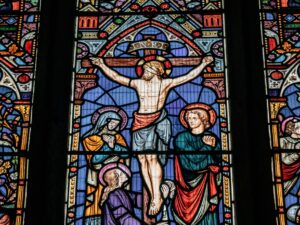A Scripture study from Caring, part three of five.
Read part two here.
Part 3: He is the Shepherd
Behind the scenes
Read what Scripture says in Matthew 14:13-21.
Beyond the surface
In this passage, the disciples found themselves partnering with Jesus. As followers, they watched Christ perform miracles. Knowing his capabilities, they brought a situation to him. This great crowd had been persistently following Jesus and his disciples, and the people needed something to eat; there simply was not enough food. The disciples urged Jesus to “send them away” (Matt. 14:15). The parallel account in John 6:5-6 tells us that Jesus was testing them and he already had a plan to provide for the people. In John 6:9, we are told that they found a boy with five loaves of barley and two fish. This was offered to Jesus and he multiplied the loaves and fishes, and as a result, 5,000 men besides the women and children were fed that day (Matt. 14:21).
Think about it
Let’s draw our attention to the obedience of the disciples. Jesus initially said, “you give them something to eat” (Matt. 14:16). Jesus didn’t say, “OK, bring them here and I’ll feed them.” Jesus could certainly do it, but he is in the process of turning his disciples into shepherds and ministers. He gave the disciples ownership. Jesus had been tending, caring and feeding the people. He was now empowering the disciples to see themselves as partners and participants.
If I were one of the disciples, I would question Jesus. He should know that I am incapable of fulfilling such a request.
After walking with Jesus for quite some time, they must have built some trust. Somehow, they believed Jesus knew what he was doing.
I have often wondered how much time lapsed between verses 16 and 17. Did the disciples already have the five loaves and two fish in front of them? Did this transpire as quickly as the text conveys? I doubt it. Perhaps, they mingled within the crowd and inquired with them about sharing food. Of course, nobody was willing to unselfishly offer up their food except for the boy in John 6:9. It’s not much, but he gave it.
In verse 19, Jesus accepted the offering, gave thanks and broke it. If Christ wanted to, he could have multiplied the bread and fish from the stones on the ground, and the disciples could have sat back and watched, but instead, he used the offering. By this, Christ reminded us to never limit or minimize the size of a gift when placed in his hands.
Between the lines
The first take away from this story is for us to remember as we follow, we move from being observers and takers to givers. The question should not be “What can Christ (or even my church) do for me?” Instead we should begin to ask “What can I offer to Christ (and to my church), as a ministry partner?” Or, maybe Christ is asking “What are you going to do about the pressing need before you?”
Secondly, we are asked to be faithful as we entrust what we have into the hands of Christ. We move from taking to offering. As little as our gift may be, Jesus tested them. He allowed the disciples to find the bread and fish. He multiplied the offering that they had brought to him.
Finally, as a follower, our relationship with Christ motivates us to respond in obedience because we know him, we trust him and we believe that he is the good shepherd who tends the sheep and cares for us. He will make a way. The shepherd provides.
In his book, “Pastorpreneuer,” John Jackson says, “Those who are gripped by big goals understand that when God is the source of these goals, he provides wisdom and strength to fulfill them.”
- Have you ever felt as if you had fallen short of the resources to fulfill Christ’s requests?
- We go to Jesus and admit and confess that, though we have little, it belongs to him. In the same way, the disciples offered what they had. It wasn’t enough, but Christ made it enough.
- Christ is the great shepherd who provides, and He accepts our offering and uses it for His service.
- That which is offered with sincerity of heart, will not be turned away.
- As you begin to see yourself as a shepherd under the leadership of Christ, our Great Shepherd, what is Christ calling you to do today? What do you have to offer?
Sign up for the Do Good Digest, our weekly newsletter, and stay tuned next week for part four.
DO GOOD:
- Download the full study and find more like it from Caring in the Scripture study library.
- Visit westernusa.salvationarmy.org to find The Salvation Army nearest you.
- Give to support the fight for good in your community.
- What does it mean to do good? Where can we discover joy? What is it really like to be homeless? How can I raise a kind kid? Subscribe to The Do Gooders Podcast with Christin Thieme to find these exact shows and more—all to help you be inspired to do good right where you are.












